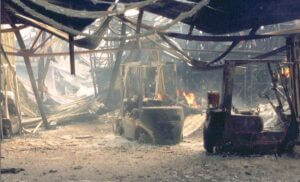Jessica joined our Hong Kong office in 2015 specialising in fire and explosion investigation and agricultural cargo claims. Since joining Hawkins, Jessica has investigated the cause of many fire and explosion incidents in both Hong Kong and overseas including in residential and commercial premises, as well as appliance and vehicle fires.
Jessica has also marine experience, having investigated fires on container and bulk cargo vessels and provided advice on ‘live’ ship fires involving cargoes such as coal and other agricultural products. She has investigated the causes of cargo contamination on tankers and been involved in cases involving the liquefaction of nickel ore, which includes witnessing laboratory tests to determine the moisture content and flow point.
We spent some time finding out more about Jessica and what led her to a career with Hawkins.
How did you get into your chosen field?
I always knew I wanted to pursue a career in the science field, so I decided to pursue a Master’s degree in forensic science after graduating from my Bachelor’s degree. I was influenced by forensic television shows when I was growing up and I thought this was one of the more interesting fields within science. I thoroughly enjoy investigations, and I am determined to find the root cause of the incident.
What attributes do you need to be a forensic investigator?
Aside from having good problem-solving skills, I think it is also crucial to be organised and to have good attention to detail. You rarely have more than one chance to inspect a scene, so you must make sure you’ve done a thorough job documenting everything.
What’s the most interesting case that you have worked on?
One of the most interesting cases that I’ve worked on is the Tianjin explosion in 2015. This was early in my career at Hawkins, and I was fortunate enough to have the opportunity to travel to Tianjin with my colleague Dr Sophie Parsons to conduct a contamination investigation. I witnessed up close, the extent of the damage that the explosion had caused and some of the scenes were eye-opening, even as a much more experienced investigator now.
What makes you proud in your role as a forensic Investigator?
Being trusted by my clients to work on some of the more high-profile cases. These are cases that you’ll see in the news and are heard across the world and it’s a privilege to be asked to provide my expertise.
“There are very few female fire investigators and even fewer in the Chinese community. It’s rewarding when a client trusts that we can perform well in this field.”
What do you love most about what you do?
I love the variety. Every case is different and interesting in its own way, and it allows me to meet and work with people in different sectors. I also enjoy the thrill of going to new and different places for scene investigations.
What is the most rewarding part of your job?
There are very few female fire investigators in our industry and even fewer in the Chinese community. I find it rewarding when a client recognises and trusts that female investigators are also capable of performing well in this field, which motivates me to continue doing what I love.
What is the most challenging part of your job?
It can be difficult to plan your life because you may need to travel at short notice to urgent scene investigations, for an unknown period of time. Some marine cases can be ongoing for days or weeks at a time. Scene investigations can also be physically demanding and potentially dangerous as some of the fire-damaged structures might not be stable. This means proper PPE and risk assessments are essential prior to stepping into a scene, as well as the comprehensive health and safety training that Hawkins provides to all its investigators.
What is the biggest misconception people have about your line of work?
It’s not as glamorous as it looks on TV! We don’t wear heels on site and contrary to some forensic shows, we don’t rely heavily on technology to solve the cases! Our experts have undertaken thousands of investigations and combine their technical knowledge and expertise with hands-on experience to understand what has happened when something goes wrong and why.
What advice would you give to somebody setting out on their career to be a forensic investigator?
Once you secure a role in your chosen field, don’t be complacent with your knowledge and skills. There is always something new to learn.
“It’s not as glamorous as it looks on TV! We don’t wear high heels on-site”.
What’s something you’ve done, but you’ll never do again?
Skydiving is one thing that I’ve checked off my bucket list and have zero desire to ever do again. Plus, I feel like the older I get the more afraid I am of heights.
What’s your guilty pleasure?
It used to be sleeping in till 1pm, but nowadays it’s sleeping in till 8am (thanks to the kids)!
Jessica is heavily involved with agricultural bulk cargo claims, specifically claims relating to soybean DDGS (distiller-dried grains with solubles). She is also experienced with providing advice on the carriage and care of cargo, sampling techniques, and laboratory analysis used to determine the physical and chemical properties of the cargo. Jessica’s article Cargo Liquefaction – Mitigating the Risk recently featured in The Marine Insurer. The article details the risk and impact of cargo liquefaction and the legislation in place for the storage, loading, and transportation of cargo to mitigate these risks.
Jessica also recently delivered a webinar on Spontaneous Combustion of Oily Rags which outlines how improperly disposed/stored oily rags can self-heat and pose a risk of fire.
If you would like Jessica or another Hawkins expert from any other discipline to investigate a case or present to your organisation, please contact us.







